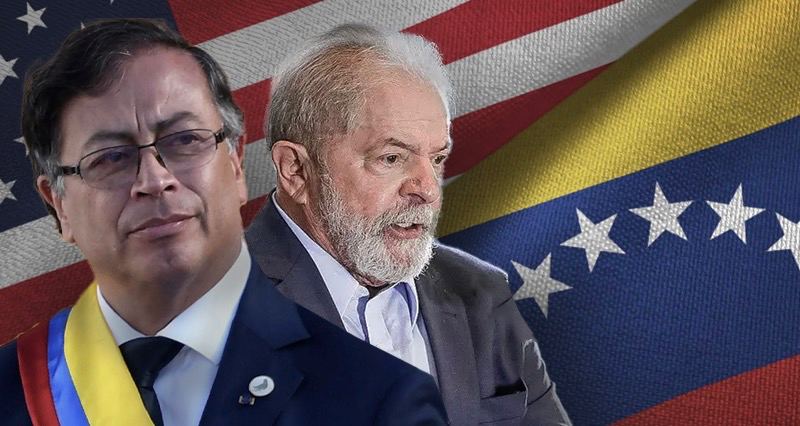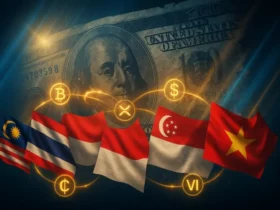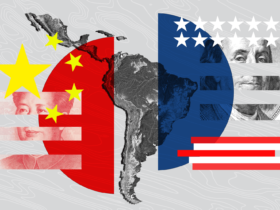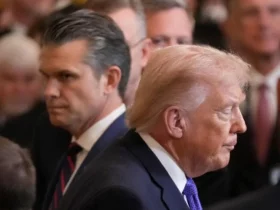I do not write this article with joy. Rather, I do it with pain, but when forms are not kept, things must be said by their name. The Presidents Lula and Petro decided to become part of the group of corifeos that, led by the United States and the European Union, attack Venezuela in the name of certain liberal values that force them to be accountable to the imperial hegemon.
Lula has been, without a doubt, a great social fighter who faced the dictatorship that devastated his country for more than 20 years. But he is not a revolutionary nor has he confronted the system of domination of his country; On the contrary, he is part of it. His objective is to produce reforms that improve the living conditions of Brazilians without touching the interests of large foreign companies that remain in the country. As it was said at the end of the last century, he is a traditional social democrat in the style of Willy Brandt or Françoise Mitterand, whom he adores and admires.
To that extent, he has not abandoned the idea of strengthening Brazilian sub-imperialism that he inherited from his predecessors by trying to build a subordinate integration. Hence his efforts to ally Mercosur and even Latin America with Europe. His political operator in these issues was, and is, Celso Amorim, a career diplomat, a typical product of Itamaraty, the Brazilian palace that hosts the foreign ministry. Amorim became a PT militant due to circumstances and mutual interests. It was Amorim who has “bombarded” Lula – after receiving instructions from the Elysée – about the “democratic shortcomings” of Venezuela, based on the legal and constitutional impossibility of Mrs. Machado to be a candidate in the elections.
It must be said that it is natural for Lula and Amorim to act like this. It responds to the DNA of the Brazilian elite that has never fought against anyone. They have obtained everything by negotiating and giving in within the framework of a systemic institutionality against which they have never rebelled. Of course, in the history of Brazil there have been great revolutionary leaders such as Tiradentes, Carlos Marighella and Luis Carlos Prestes among others. Lula is not one of them.
The ambiguity of his speech (and that of Dilma Rousseff, even more accentuated), isolated him from the people. Both abandoned the humble people who brought them to power. At this moment I remember when in 2006 the popular and social organizations of Brazil asked Commander Chávez to intercede with Lula so that he would listen to them. With Lula’s approval, Chávez risked his political capital and, taking advantage of a trip to Curitiba, met in a theater full of leaders and social leaders who came from all over the country to present such a demand face to face. Even putting his physical integrity at risk because a small group of hotheads wanted to violently approach him, he listened to them patiently, took note and told them that he understood their reasons, that he was going to do what they asked of him but that at the present moment of Brazil, he thought that Lula should be supported. I don’t think that in his entire life, Chávez has received such a loud shout as the one he patiently listened to that day until once things had calmed down. He spoke at length to the attendees about the superior cause of Latin America and the Caribbean, closing the event with continued and effusive applause and cheers.
Years later, when they carried out the coup d’état, Dilma called on the people to take to the streets. Nobody did. It was normal, she had not picked up the phone on calls from the social leaders, she had not received them, nor had she attended to them. Her alliance was with businessmen, one of them, who was her vice president, was the leader of the coup that overthrew her. The abandonment of the people is paid dearly. They gave us lessons, I remember the petulance and arrogance of some PT leaders who told us what we should do, but here, Chávez resisted the coup d’état, because the mobilized people restored him to power.
They did not even mobilize in favor of Lula when he was imprisoned. The large events that called for his freedom brought together 40 thousand people in a country of 215 million inhabitants. And it is normal that it has been like that. At the moment when he was being taken to prison, Lula, in the most complete version of a man of the institutions, said: “I trust the legal system of Brazil.” He did not appeal to the people, no, he trusted the institutions.
Perhaps these are positive characteristics: conciliation, pusillanimous character and weakness of spirit. At the end, the monarchy gave them the independence and the Republic and it is possible that this history has shaped their conciliatory spirit. But no one gave Venezuela anything, we had to fight for it and at a very high cost. Therefore, we do our thing and they do their thing, but it is not Lula who can lecture us on democracy.
Nor can Lula lecture about Latin American sentiment and spirit. I said before that he thinks about the need for subordinate integration. These are not empty words: Who prevented the establishment of a financial architecture in South America? Who put all kinds of obstacles to SUCRE until it was prevented from working? Who paid little attention to the creation of CELAC until they understood that they needed it as a platform to launch themselves into conquering a permanent position on the UN Security Council? Who supported UNASUR only when Itamaraty was sure she could control it? Who fled Mar del Plata when Chávez, Kirchner, Tabaré Vázquez and even the conservative Nicanor Duarte stood up to the head of the empire? Who delayed as long as possible the construction of the Abreu e Lima refinery that Chávez promoted for the well-being of the forgotten and marginalized northeast of Brazil? Who, before the coup d’état against President Castillo in Peru, said that it had been a transition in institutional terms?
I respect what Lula may have done for his people. I don’t know if that’s all he could do, but he cannot, nor should, be giving lessons on democracy to anyone. At least in Venezuela, we don’t permit that. If Mrs. Machado granted you that right, you must understand with her and assume the responsibility of allying yourself with those who advocate terrorism and favor foreign military intervention in the country. Why is it that if Bolsonaro does it, it is wrong, but if Machado does it, it is correct? Why did one act outside the law and another did so in favor of democracy? Why is Bolsonaro a coup leader and Machado not? Clarify it, Mr. President Lula, because otherwise President Maduro could have the right to request that the persecution against former President Bolsonaro to cease. What do you think? Of course, President Maduro will never do that, first because he does not interfere in the internal affairs of Brazil and second because he will never support a violent terrorist and coup plotter like you are doing in Venezuela.
Dear comrade Lula, I would like to remind you that the first president to express solidarity with you after your unjust imprisonment was Nicolás Maduro and the first president to express his rejection and repudiation of the coup d’état against Dilma Rousseff was Nicolás Maduro. There was no political calculation in deciding those actions. Today we collect the spirit and solidarity of the Brazilian people who reject their demonstrations of support for terrorism in Venezuela. It is also good to remember that on July 25, 2019, Mrs. Machado tweeted against you and the danger it meant for the Sao Paulo Forum to demand your freedom.
As young people say now, “you are in another”, President Lula. While the African people rebel and break with France, you declare your love for Macron in the same place where French companies devastate the Amazon without incident. More coherence president, because that is serious.
Another case, much more painful, is that of Colombia and its president. He also joined those who believe they are owners of the truth and can teach democracy lessons to the world. We bequeath from our Liberator Simón Bolívar the love for Colombia. When they made laws in Bogotá to fight against colonialism, Bolívar built an Army to go and liberate New Granada. The blood of thousands of Venezuelans was shed to achieve the independence of Colombia. When the expedition was being prepared, Antonio Nariño, the most renowned tribune of the country and one of the precursors of Spanish-American independence, was imprisoned in Spain. The Liberator had to turn to the highest-ranking New Granada officer to send him to Casanare to organize an army that would receive the Venezuelan army and support it in the campaign that was being prepared.
He had to turn to an obscure colonel without much experience, whom, to give him greater decision-making power, he promoted to general: Francisco de Paula Santander, who over the years would become the champion of Colombia’s independence, but not before betraying Bolívar, ordering the assassination of Sucre and even attempting the same expedient with the Liberator. We have known for 200 years about the betrayals carried out in Bogotá. They don’t surprise us.
There were 200 years of liberal-conservative collusion that plunged the country into war, destruction and death, until Gustavo Petro became president. Finally, a different leader…and boy is he. His effort for the definitive pacification of the country deserves the greatest praise. Since before, Commander Chávez and now, President Nicolás Maduro have given all their support to such an enterprise, even when there were satraps governing it in the sister country. I know it, because I was a direct witness of the effort, sometimes even incomprehensible, of Commander Chávez to support the fight for peace in Colombia.
Petro’s problem is not that. It is his ego, his desire to believe that he has the absolute truth and that he can teach everyone lessons. And now that he has a man from the right, an employee of the United States embassy, as Minister of Foreign Affairs, it seems that he has been made to follow the guideline drawn up in Washington. This would not have happened if Foreign Minister Álvaro Leyva had been in office, because despite being a man of the right, he has given substantial evidence in defense of the highest interests of humanity.
The height of Petro’s ego occurred recently when he allowed himself to criticize and refute the Russian and Chinese decision to veto a proposal for a temporary ceasefire in Palestine, prepared by the United States to favor Israel. Palestinian organizations unanimously thanked Russia and China for the decision, but Petro, being “more Palestinian than the Palestinians,” criticized it. This decision allowed for the subsequent one, approved three days later, in which the United States was forced to refrain from using its right to veto. Then Petro, trying to flee forward, said that if the resolution was not fulfilled, relations with Israel had to be broken. President Petro do it. Do it! But first he must wage an internal struggle against his ego, which oppresses him and does not allow him to think with the lucidity, knowledge and coherence that have graced him in other matters. “The best way to say is to do,” José Martí taught, “Better than saying is doing, better than promising is doing,” said Juan Domingo Perón.
Venezuela did not have to wait for 32,000 murdered Palestinians, including 12,000 children, to break relations with the genocidal entity. The decision was made by President Chávez in 2009 when the Zionist barbarity was not even close to the levels of repugnance that have been made public today. Do not try to give lessons to others about something that you do not do.
And regarding Venezuela, don’t do what you wouldn’t want to be done to you. Because if that were the case, President Maduro could call to accept that Commander Antonio García or Commander Iván Márquez be allowed to be candidates for president. When in 2002, Colombia decided to elect a well-known drug trafficker and notorious paramilitary as president of the country, Venezuela said nothing. On the contrary, I remember Commander Chávez in a conversation on the subject in the pavilion of the Maracaibo airport, on May 8, 2006 when he was heading to Guajira to lay the first section of the binational gas pipeline: “The Colombian people chose him and we have to respect the decision of the Colombian people and work with Uribe for the benefit of our two brother peoples.” So it was. Not even in the conditions in which Uribe gave one hand while at the same time with the other, like a modern Santander, he wielded the fratricidal weapon, did Chávez modify his preaching.
Recently the Venezuelan government has done everything in its power to promote a good relationship. You know it because you have been a fervent promoter of the same thing. We do not deserve that you judge us, defending a terrorist who, by violating the laws of the Republic, excluded herself from being a candidate.
By the way, when you won the 2022 presidential elections, that same Mrs. Machado, just one day after, that is, on June 20, wrote a tweet: “The Petro project is very dangerous, but it is defeatable. Let us Colombians and Venezuelans fight together for our freedom.” Paradoxically, Mr. President Petro, you accepted the call of the terrorist and now, together with her, you want to fight in Venezuela for a democracy remotely controlled from Washington.
This thing of being for a while with Venezuela and another time against it, based on an interested and petty political calculation, is not ours. Bolívar taught us that one is in solidarity or one is not and he took the Venezuelan army out of the national territory when our independence had been consummated in Carabobo because he believed that freedom was not total as long as a subjugated American people remained. At the end of the war, our soldiers returned to the country, they did not colonize, they did not occupy, they did not impose anything.
Chávez, for his part, was not making political calculations either when he decided to use the country’s enormous energy resources to move towards integration, improving the living conditions of the people, and he did so without asking what political affiliation the president was. Nor did he have an opinion on who should and who should not be the top leader of a country. We did not make political calculations when we helped Argentina at a dire moment for that country. The Venezuelan government did not make political calculations when President Maduro ordered oxygen to be sent to Manaus hospitals at the worst moment of the pandemic, although it was the moment when Bolsonaro’s aggression against Venezuela intensified. We showed solidarity and we gave solidarity.
We did not make political calculations when we created Petrocaribe, nor when we multiplied our embassies in Africa, nor when we expressed solidarity with Palestine or the Sahrawi Arab Democratic Republic. We do not ask the United States and Europe if they agree with our decisions before implementing them.
In times when imperialist and neoliberal aggression is intensifying, those of us who think alike, not necessarily the same, must understand and accept each other. All it takes is a phone call and a consultation. It doesn’t matter if they hear it at the United States Embassy. This way, they will know that we are brothers through thick and thin. In this way, erroneous opinions emanating from the disinforming transnational media and imperial agents infiltrated in our governments are also avoided.
All this is very sad, mister presidents, but while you ally yourself with the terrorism of the Venezuelan right, our country, our electoral system and our process receive the support of Russia, China, the majority of humanity and, by the way, very important to say, of the brother peoples of Brazil and Colombia. There is an old saying that goes “Tell me who you are with and I will tell you who you are.” Be very careful, dear presidents Lula and Petro.

















Leave a Reply